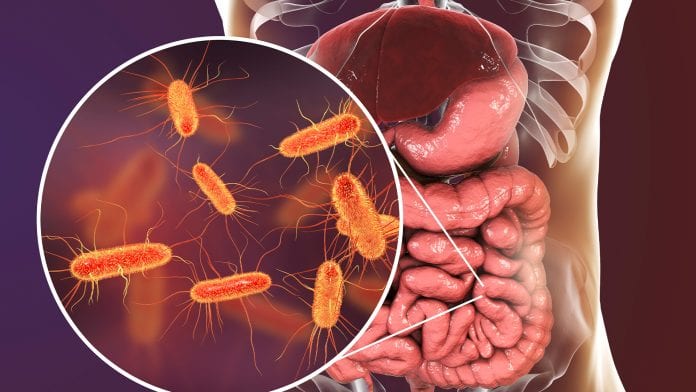
Researchers have established a correlation between depression and a group of neurotransmitter-producing bacteria found in human gut bacterium.
From the U.S. Department of Energy’s (DOE) Argonne National Laboratory, Northeastern University and other institutions, researchers made the connection between human gut bacterium and depression by first isolating the KLE1738, a bacterium that has a surprising dependency upon a brain chemical called gamma-aminobutyric acid (GABA).
Gamma-aminobutyric acid and human gut bacterium
Jack Gilbert, group leader for microbial ecology at Argonne, explains: “The association of microbial GABAmetabolism with mental health is highly compelling.”
“The general ability of the microbiome to produce and/or consume GABA has not been as broadly described before, and a bacterium dependent on GABAhas never been reported.”
Gilbert and 18 co-authors published their findings in Nature Microbiology.
“Because of its unique growth requirements, nobody else has reported growing KLE1738,” said Philip Strandwitz, article lead author and a postdoctoral research associate at Northeastern University’s Antimicrobial Discovery Center, USA.
“The association of microbial GABA metabolism [the brain protein gamma-aminobutyric acid (GABA)] with mental health is highly compelling.” adds Gilbert.
Most wanted list
KLE1738 had previously appeared on the ‘most wanted list’ of the National Institutes of Health, meaning that it was yet to be cultured, despite its relative prevalence in the human gut.
The bacterium has been detected in nearly 20% of the human gut microbiomes available in the Integrated Microbial Next Generation Sequencing Database.
Gut microbiota, the entire collection of microorganisms found in that habitat, affect many important functions, including the immune response and the nervous system. Nevertheless, many microorganisms residing in the human gut remain uncultured, which the research team referred to as “an obstacle for understanding their biological roles” in the Nature Microbiology article.
Why are we not culturing human gut bacterium?
The microorganisms most likely remain uncultured as they require key growth factors that are provided by neighbouring bacteria in their natural environments, but not under artificial laboratory conditions.
During an extensive screening process, the team discovered that KLE1738 required the presence of Bacteroides fragilis, a common human gut bacterium, to grow.
Further biological testing and purification led to the isolation of GABA as the growth factor produced by Bacteroides fragilis. GABA was, in fact, the only nutrient tested during the experiments that supported the growth of KLE1738.
The next phase of connecting human gut bacterium to depression
In the next research phase, the team explored the possible connection between Bacteroides and depression. Stool samples and functional magnetic resonance imaging measurements of brain activity were collected from 23 subjects suffering from clinically diagnosed depression.
The researchers found an inverse relationship between the relative abundance of faecal Bacteroides and functional connectivity in a part of the brain associated with elevated activity during depression.
This means that low abundance of Bacteroides was associated with high activity in that part of the brain, and vice versa.
“A good first step is to repeat our findings in additional human cohorts, which we are actively exploring.” Concludes Strandwitz.
“When it comes to depression, animal models are often difficult to translate, which is why we are so excited about human studies. “









